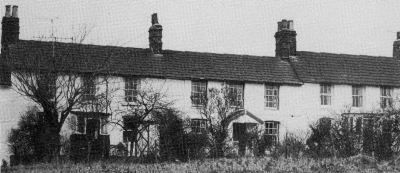Mr Don Sattin kindly agreed that we may print condensed extracts from his book “Just Off the Swale”.
The Coastguards
The Kent Coast Blockade was formed by the government to fight the enormous organised free trade or smuggling gangs, which built up during the long Napoleonic Wars with France. Originally the seventy- four gun ship H.M.S. Ramillies had been anchored in the Downs, the sailors coming ashore each night to patrol the coast. But this was not a good idea, as there were gaps when each shift changed. So around 1818 it was decided to move ashore, using the Martello Towers where they were able to, and building new stations where necessary. The Kent Coast Blockade was split into three divisions: we are only interested in the left division, as it concerns Conyer. We can be sure that the Coastguards Cottages built on the hill in Conyer were built between 1818 and 1829. On September 27th 1829, an advertisement appeared in the Kentish Gazette listing the stations, with this wording:
TO BAKERS
Such persons as are willing to contract for supplying the Officers and men of His Majesty's Ship Ramillies for the undermentioned places.... The list starts with Conyer and ends with Bishopstone, obviously for delivery reasons. It continues: “The contract to be supplied by some person residing at Canterbury; Herne Bay; Whitstable; or Faversham, who will not be allowed to perform his contract by agents”.
AND TO BUTCHERS
For supplying good fat well fed Ox Beef. Tenders to:- JOHN QUINNELL, purser. Left Division Blockade.
Civilians were rapidly replacing the sailors. In 1831 the service became known as Preventive Water Guard, and in fact it was not called Coastguards until 1864.
There is no doubt that Conyer was a bad area in relation to the size of the station, with its armoury and Customs House, which stood close to the Shipyard (this building was pulled down about 1947). Up to 1939 smuggling still went on in Conyer. I was questioned several times by Coastguards about various boats that used the shipyard. I knew of at least one which was engaged in smuggling. Eventually it was caught at Ramsgate.
One of the customs officers who daily visited Conyer had to pass a farm which brewed cider; it appears that he could not pass this place without sampling the brew, and by the time he reached Conyer he was pushing his cycle instead of riding it. He would go into our forge and sleep it off and on waking he would ask if anything had come in on the tide. Time and Tide waits for no man!
Of the last two smugglers caught at Conyer one turned Kings Evidence, was released, prospered and became rich; the other who had been sent to St. Helena returned and lived for many years on an old boat off the creek, and was drowned one stormy night when the boat overturned.
Talking to a Conyer born friend over a pint in the local, he told me how one of his relations, many years ago, had an enormous amount of smuggled tea in his house. This had been smuggled into Conyer by devious routes. The Customs got to hear of this and started a search. Not knowing what to do with the tea they made a bed of it, they then put the lady of the house to bed after dusting her face with flour. When the Customs men searched the house they asked the family what was wrong with the lady. On being told that she had the ague, they left without further searching.
Not so many years ago there were families living in Conyer who still had lace that had been smuggled in.
Going back to the year 1730, the farmers had to raise farm wages to the princely sum of l/6d per day, which was perhaps a reasonably good wage as this was mainly an agricultural area. Even so the farmers had great difficulty in finding enough workmen to work their land. The people were finding it paid better to run smuggled goods, such as tobacco, tea, brandy, silks and lace. Consequently the farmers, finding it hard to make a living themselves, likewise turned to “Owling” (the smuggling of wool out of the country to France), which was at that time illegal.
If you wake at midnight, and hear an horses feet,
Don't go drawing back the blind, or looking in the street,
Them that ask no questions, isn't told a lie,
Watch the wall, my darling, while the Gentlemen go by!
Rudyard Kipling
Copyright: Don Sattin

Coastguard Cottages, Conyer.